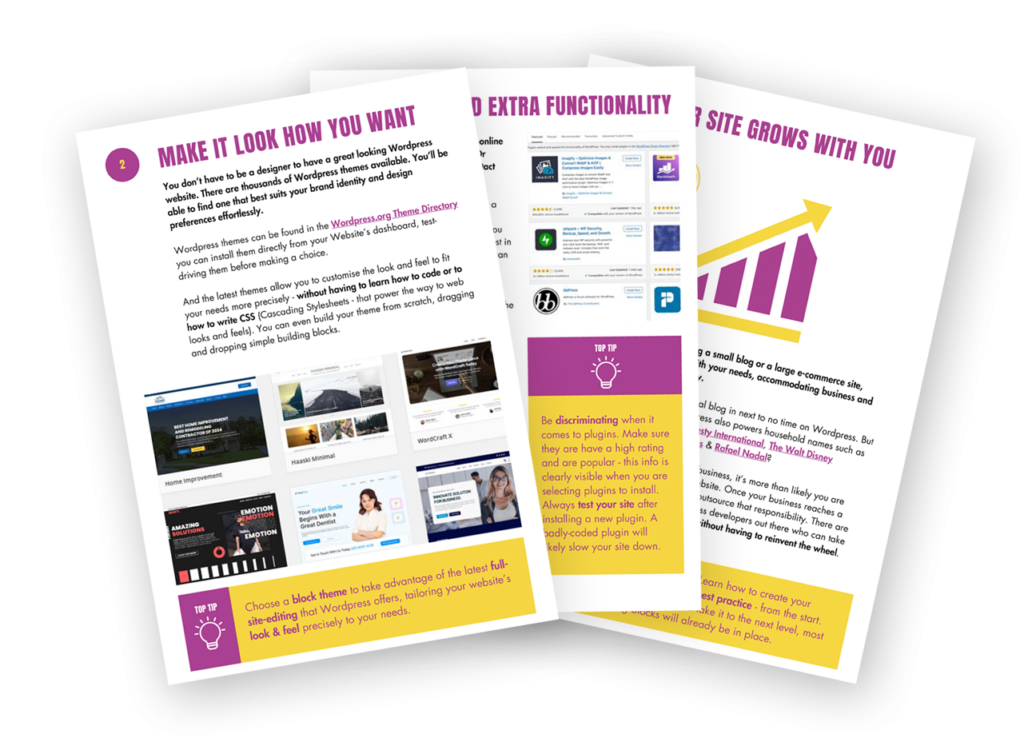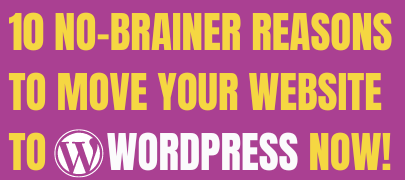So, you’ve built your WordPress website. Your business has now got an online presence and the best bit is you’re completely in charge of it. Boom, you’re totally smashing it!
The thing is, everyone’s got a website these days, so how can you make yours stand out in a crowded online space?
The answer is… with a blog.
Yep, adding a blog to your WordPress website is the secret ingredient to business growth and it’s something that is often overlooked by many business owners. Which means if you add a blog and start consistently sharing blog posts on your site, you’re going to be a few steps ahead of the competition. And that’s everything these days.
In this article I’m going to show you the benefits of having a blog on WordPress and how you should be using WordPress to grow your business online. So, without further ado, let’s take a look at the 7 solid reasons your WordPress website needs a blog:
1. Having a blog on your WordPress website will boost your SEO
WordPress is already a pretty SEO-friendly platform to have your website on, so you’re probably wondering why you need a blog as well?
The thing is once you’ve created your website, you’ve got the words sorted on it, the images done, the products or services listed, that’s it, you’re unlikely to change anything on it for some time. Sure, if you’re a product based business you might be uploading new stock every now and again but other than that it’s going to stay the same, right?
And that’s a problem.
Because Google has a massive appetite for fresh content. And unless you regularly feed it delicious new content, it’s not going to remember you. You can put as many keywords as you want in your website content, but the fact is if you’re not feeding Google’s appetite for fresh content, you are not going to rank as well as those websites that are.
And that’s where blogging can help.
The SEO benefits of blogging on WordPress are massive. There are so many opportunities for you to target different keywords that potential customers are looking for within your blog posts. And with WordPress plugins like Yoast SEO and Rank Math it makes the job of optimizing your posts super easy.
2. A blog drives more traffic to your website
You might be wondering how blogging improves WordPress website traffic. And it’s a really good question, which ties in nicely with the point I made above about static v’s changing content.
I want you to imagine a shop window. It’s been beautifully decorated, there are gorgeous products on display, with some great offers advertised, and key information like the name of the shop and its opening hours are really easy to find. You couldn’t help but notice it as you walked down the street, in fact you crossed over the road especially to go and have a closer look. And it continues to grab your attention for a while. It makes you smile every time you pass it.
But then weeks, months pass and the shop window still has the exact same display. To be honest you no longer notice it. You walk past, scrolling through your phone, completely blind to the sight that once captivated you.
That’s what’s happening to your website.
Your WordPress website needs a blog because it helps keep things fresh and new and interesting. It’s the thing that will attract new visitors and keep them coming back time and time again.
Just like if that shop window regularly changed its display, if you change the content on your website by using a blog the footfall to your website will improve. More footfall to your website means more leads, and more leads means more sales.
3. It establishes you as an authority figure
So, being able to share blog posts on your WordPress website is great for SEO and for driving traffic. But there’s more to it than that. Because when it comes to people buying something from your website – whether that’s a product or a service you offer – they’re only going to do it if they consider you a trusted source.
Now, there are some obvious ways you can go about building this trust factor with potential new customers. For example, you might have reviews, or testimonials that you can post on your website to back up what you’re telling them. But the thing is with this is that from a customer’s point of view how do they know you’re not just making this up. We all know this happens loads on Amazon and big websites like that, so who’s to say that yours aren’t made up too? Where’s the proof either way??
This is another reason why your WordPress website needs a blog. Because people want to buy from people they trust. And a website which shares valuable, high-quality, useful and informative blog posts establishes itself as credible and trustworthy.
A blog gives you the opportunity to show off your expertise in your particular area of business. By consistently sharing advice, guides, case studies, and in depth knowledge about your industry you get to showcase yourself as an authority figure. Someone who knows what they’re talking about and someone who they should listen to and most importantly who they should trust.
4. A WordPress blog helps you connect with your audience
The beauty of using WordPress for your website is that it makes it really easy to format blog posts in a way that works for you. You can also enable comments and add contact forms so that you can further strengthen the connection you have with your audience. It shows them that there is a real life person behind the business.
A blog gives you the opportunity to let your personality shine through. It allows you to share stories, to be vulnerable, to showcase the person behind the business, to show your successes, your failures, and the lessons you’ve learned along the way. This is about more than a blog being an effective marketing tool, this is a blog making connections and forming trusted bonds with your audience.
By striking up a two way conversation with your readers it encourages them to interact and engage with you. And by getting feedback from them and by responding to their comments, it helps you know exactly what they need from you. Which is massively valuable information!
WordPress makes it easy for you to connect with your customers through email marketing and newsletters by using integrated plugins like Mailchimp or Kit. These can help you capture leads directly from your blog posts and allow you to build up an email list.
5. Blog posts generate leads and sales
While we’re on the subject of lead generation, let’s explore how to get more leads from your WordPress blog in more detail.
Now, if you’re using your website correctly you’ll already have various CTAs (calls to action) in place. I’d like to think you’ve already got easy ways for visitors to contact you, to buy from you, to sign up to something you’re offering. PS. If you haven’t, get on it, you’re missing a trick!
But just like the content on your website, these CTAs are all static and fixed in just one or two places.
Every new blog post you publish could and should contain at least one CTA. So, suddenly every time you’re adding a post you’re making it a little bit easier and more likely that someone will take action on your site.
Now, don’t get me wrong, you can’t just go whacking these CTAs wherever you like in your blog posts, there needs to be some kind of strategy. And if you’re interested in reading more about the best way to format your blog posts with CTAs you can take a read of my simple guide:
How To Structure A Blog Post Like A Pro: A Simple Guide
Just know that every blog post you publish can effectively work as a mini sales funnel for you, leading your visitors to exactly where you want them to go. And WordPress makes this easy to set up with CTA plugins like WPForms.
6. Blogs keep websites active
A website without changing content can start to feel a bit stagnant after a while. A bit like that shop window I was talking about earlier.
Sharing blog posts will help keep your website on Google’s radar. Which is absolutely essential if you want potential new customers to find you. Because Google loves and prioritises websites that are regularly updated as it shows that the website is active.
If your website hasn’t been updated in months (or in some instances years) Google will automatically assume that the content is outdated and no longer relevant and it will push your website lower down the rankings. On the flip side, websites that regularly update their content, will be seen as fresh, relevant and engaged and pushed higher up the rankings.
Having a blog on your WordPress website means you can easily add new content without the faff of having to redesign the whole look of your website. And once you’ve been blogging for a while, you can go back and update old posts to ensure that they remain relevant too.
If you’re worried about how on earth you’re going to fit blogging in, you needn’t be, as you can write a high-quality blog post in under an hour. And with WordPress’s scheduling feature you can even plan content in advance. This means you can batch create content and then schedule it in advance keeping your website active without having to constantly log in to post updates.
Like this post? Why not subscribe for FREE?
A new blog post each week…plus weekly help, guidance and support direct to your inbox…
7. Every blog post can be repurposed
One of the best things about blogging on WordPress is how easy it is to share your content on social media. If you install the Jetpack plugin it will automatically share new blog posts straight to social media for you. Just think of all the time that will save you!
Remember a blog post isn’t just a blog post. Once you’ve written a blog post and published it on your website that same post can be broken down and repurposed into lots of different content.
For example, you can:
- Take key points from your blog post and create Instagram carousels or reels.
- Use excerpts of your blog post in Facebook or LinkedIn posts.
- Share snippets of your blog post to Instagram stories.
- Take the topic of your blog post and use it as the basis of your email newsletter.
Using bite sized pieces from your blog post not only has the benefit of saving you a tonne of time, but it also acts as a CTA in its own right. When people see glimpses of your blog post on social media, as long as you position it well and set the curiosity factor just right, people will want to click through to read the rest of the post. And bingo, you’ve created your own source of web traffic!
Final thoughts
If you’re using WordPress for your business website, a blog isn’t just something that you whack on there because you think it should have one or because the template you’ve chosen comes with one.
A blog is an essential tool for growth. It helps your SEO. It helps drive traffic to your website. It builds credibility, and it nurtures your audience.
So, if you haven’t started blogging yet, let’s help get you started!





